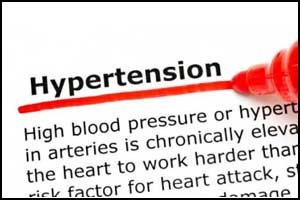- Home
- Editorial
- News
- Practice Guidelines
- Anesthesiology Guidelines
- Cancer Guidelines
- Cardiac Sciences Guidelines
- Critical Care Guidelines
- Dentistry Guidelines
- Dermatology Guidelines
- Diabetes and Endo Guidelines
- Diagnostics Guidelines
- ENT Guidelines
- Featured Practice Guidelines
- Gastroenterology Guidelines
- Geriatrics Guidelines
- Medicine Guidelines
- Nephrology Guidelines
- Neurosciences Guidelines
- Obs and Gynae Guidelines
- Ophthalmology Guidelines
- Orthopaedics Guidelines
- Paediatrics Guidelines
- Psychiatry Guidelines
- Pulmonology Guidelines
- Radiology Guidelines
- Surgery Guidelines
- Urology Guidelines
1 in 5 hypertension patients in India have resistant hypertension: JAPI

Jaipur, Rajasthan: One in five patients with hypertension (high BP) in India have resistant hypertension and need multiple drugs to control BP. The prevalence is significantly greater among patients older than 60 years and in women.
The findings, published in the Journal of the Association of Physicians of India, are observed at an urban secondary care clinic and may not be applicable to all patients with hypertension seen at primary care in urban and rural areas of the country.
Hypertension is the most important non-communicable disease risk factor in India and an important cause of mortality and morbidity. It can be managed in primary care by simple and inexpensive medicines, despite this hypertension control rates remain low. A meta-analysis reported that less than 20% of hypertension patients in India have their BP under control. Also, there are hypertension patients who are not well controlled despite medications, a condition known as resistant hypertension.
The American Heart Association (AHA) defines resistant hypertension as above goal elevated BP (>140 and/or 90 mmHg) in a patient despite concurrent use of three antihypertensive drug classes commonly including a long-acting calcium channel blocker (CCB), angiotensin-converting enzyme inhibitor (ACEi) or angiotensin receptor blocker (ARB) and a diuretic. The drugs should be administered at maximum or maximally tolerated daily doses. Resistant hypertension also includes patients whose BP achieves target values on ≥ 4 antihypertensive medications.
European Society of Cardiology (ESC) 2018 Hypertension Guidelines have made more stringent definition while retaining AHA criteria.7 Accordingly, it is defined when recommended treatment strategy fails to lower office BP to <140 mmHg and/or <90 mmHg, the control of BP is confirmed by ambulatory or home blood pressure measurement and good adherence is demonstrated.
In their study, Rajeev Gupta, Chairman, Preventive Cardiology and Internal Medicine, Eternal Heart Care Centre and Research Institute, Jaipur, Rajasthan, and colleagues performed a registry-based study at a single center in patients with the primary diagnosis of hypertension (n=3073). The mean age of patients was 59±13 years, 47% were women and 26% <50y agE. Details of co-morbidities, medications and BP control were obtained. Patients with coronary heart disease, cerebrovascular disease and chronic kidney disease were excluded. Resistant hypertension was defined as uncontrolled hypertension (BP ≥140/90) with use of 3 drugs of which one was a diuretic, or any 4 drugs.
Key findings of the study include:
- Diabetes was in 31.1%, hypothyroidism in 7.9% and chronic obstructive lung disease in 4.3%.
- The drugs prescribed were angiotensin-converting enzyme inhibitors (ACEi) or angiotensin receptor blockers (ARB) in 61.5%, beta-blockers in 49.8%, dihydropyridine calcium channel blockers (CCB) in 46.8%, ARB in 44.4%, diuretics in 32.1% ACEi in 13.4%, other CCBs in 2.6% and mineralocorticoid receptor antagonists (MRA) in 1.1%.
- One antihypertensive drug was prescribed in 27.4%, two in 41.2%, three in 18.6% and four or more in 5.4%.
- The prevalence of resistant hypertension using standard definition was 19.4%.
- It was more in women (23.5%) vs men (15.7%).
- Using the alternate definition the prevalence was 6.3% and also more in women (6.9%) vs men (5.4%).
- Resistant hypertension was more common in patients >60 years (odds ratio 1.36) and women (odds ratio 1.64).
"The present study shows a high prevalence of resistant hypertension in a secondary-level medical practice in India. The prevalence is similar to previous reports from India and more than the prevalence in global studies. The prevalence is greater among women and older patients," wrote the authors.
"More studies are required to exactly characterize these patients so that optimum pharmacotherapy can be developed in such patients. Hypertension is a major problem in India and there is a need for national bodies to develop guidelines for optimum BP management strategies at a clinical and community levels to reduce its escalating burden in the country," they concluded.
The study, "Resistant Hypertension in Clinical Practice in India: Jaipur Heart Watch," is published in the Journal of the Association of Physicians of India.

Disclaimer: This site is primarily intended for healthcare professionals. Any content/information on this website does not replace the advice of medical and/or health professionals and should not be construed as medical/diagnostic advice/endorsement or prescription. Use of this site is subject to our terms of use, privacy policy, advertisement policy. © 2020 Minerva Medical Treatment Pvt Ltd